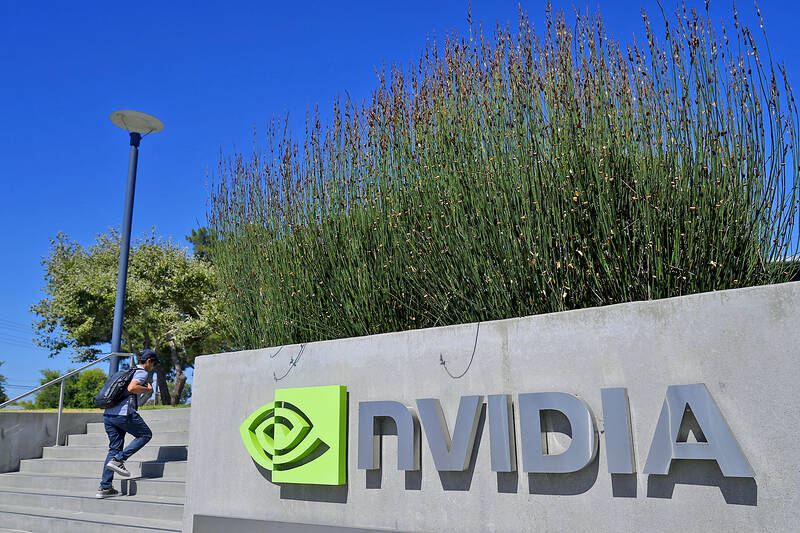Nvidia Corp is set to unveil investment plans for Thailand, joining Alphabet Inc and Microsoft Corp, as Southeast Asia becomes a hot spot for building artificial intelligence (AI) data centers and manufacturing the components that power them.
The US chip designing firm would announce investments during chief executive officer Jensen Huang’s (黃仁勳) trip to Bangkok in December, Thai Minister of Commerce Pichai Naripthaphan said on Monday.
He declined to give details on the investment or how much the company would bring into Thailand.

Photo: AP
The investment by Nvidia could lead to more funding “with related clusters following suit,” Pichai said.
Clinching Nvidia as an investor in Thailand would be a shot in the arm for Southeast Asia’s second-largest economy that has been vying with its neighbors to attract investments from tech giants. Thailand has bagged multibillion dollar investments over the past few years from Amazon.com Inc, Google and Microsoft to build data centers and other cloud infrastructure.
A spokesperson for Nvidia did not reply to an e-mailed request for comment.
The Santa Clara, California-based company has pledged investments in building AI infrastructure in Indonesia and Malaysia, and is exploring opportunities in Vietnam.
Nvidia’s chips are manufactured by Taiwan Semiconductor Manufacturing Co (台積電) and its AI servers are built mostly by Taiwanese assemblers.
A longtime manufacturing powerhouse for vehicles and electronics, Thailand is playing catch-up with Malaysia and Singapore. It wants to bolster growth from an average of less than 2 percent under a decade of military-backed rule.
Interest from Nvidia, other tech companies, and those in the supply chain should boost investment applications back to levels before a 2014 coup and help Thailand regain “lost opportunities” in that decade, Pichai said.
“The outlook for the Thai economy is bright and this is only the beginning,” said the veteran politician, who was appointed to the job last month in the administration of the Thai Prime Minister Paetongtarn Shinawatra.
There is already a surge in foreign investment pledges in Thailand this year, especially into the data centers and printed circuit board manufacturing. Official data showed investment pledges jumped 42 percent to 722.5 billion baht (US$21.6 billion) in the first nine months of this year from a year ago.
Pichai said new investment proposals, including from domestic companies, might reach as much as 1 trillion baht this year.

Application-specific integrated circuit designer Faraday Technology Corp (智原) yesterday said that although revenue this quarter would decline 30 percent from last quarter, it retained its full-year forecast of revenue growth of 100 percent. The company attributed the quarterly drop to a slowdown in customers’ production of chips using Faraday’s advanced packaging technology. The company is still confident about its revenue growth this year, given its strong “design-win” — or the projects it won to help customers design their chips, Faraday president Steve Wang (王國雍) told an online earnings conference. “The design-win this year is better than we expected. We believe we will win

Intel Corp chief executive officer Lip-Bu Tan (陳立武) is expected to meet with Taiwanese suppliers next month in conjunction with the opening of the Computex Taipei trade show, supply chain sources said on Monday. The visit, the first for Tan to Taiwan since assuming his new post last month, would be aimed at enhancing Intel’s ties with suppliers in Taiwan as he attempts to help turn around the struggling US chipmaker, the sources said. Tan is to hold a banquet to celebrate Intel’s 40-year presence in Taiwan before Computex opens on May 20 and invite dozens of Taiwanese suppliers to exchange views

Chizuko Kimura has become the first female sushi chef in the world to win a Michelin star, fulfilling a promise she made to her dying husband to continue his legacy. The 54-year-old Japanese chef regained the Michelin star her late husband, Shunei Kimura, won three years ago for their Sushi Shunei restaurant in Paris. For Shunei Kimura, the star was a dream come true. However, the joy was short-lived. He died from cancer just three months later in June 2022. He was 65. The following year, the restaurant in the heart of Montmartre lost its star rating. Chizuko Kimura insisted that the new star is still down

While China’s leaders use their economic and political might to fight US President Donald Trump’s trade war “to the end,” its army of social media soldiers are embarking on a more humorous campaign online. Trump’s tariff blitz has seen Washington and Beijing impose eye-watering duties on imports from the other, fanning a standoff between the economic superpowers that has sparked global recession fears and sent markets into a tailspin. Trump says his policy is a response to years of being “ripped off” by other countries and aims to bring manufacturing to the US, forcing companies to employ US workers. However, China’s online warriors